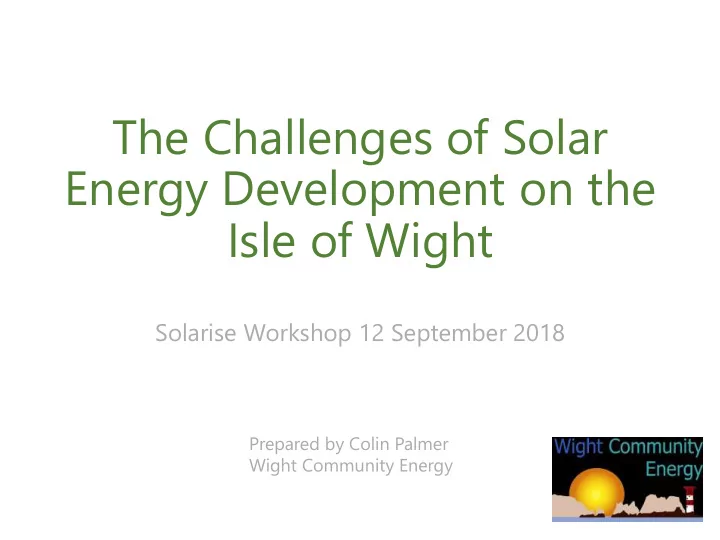

The Challenges of Solar Energy Development on the Isle of Wight Solarise Workshop 12 September 2018 Prepared by Colin Palmer Wight Community Energy
Solar energy on the Island We’re in the red zone
Connected capacity • 80MW large scale PV • 7.2MW domestic rooftop PV • 4.5MW commercial barn/rooftop • 5MW biomethane
Domestic capacity Circa 2,500 installations (3%) Average size 3.01kW
Ambition and progress • 100% annual electricity = renewable • Total electricity 563GWh • Domestic 265GWh • Total renewable 114GWh • 43% domestic electricity
2030 scenario • 15% Evs, 21GWh • Domestic & Commercial 533GWh
2030 scenario – EVs • EVs as storage • 10 LEAFs = 1,000 homes (for an hour) • 15% penetration by 2030 • Total capacity = 500MWh • Average demand = 64MW • 20% EV capacity = 1.5hrs (2hrs at min)
What’s stopping us? • Constrained grid • Undersea cables (max 200MW) • Summer solar export peak • Summer low demand (35MW) • 140MW Cowes power station (STOR only) • Old and inefficient
SSEPD’s present solution • 4kW/phase max • Active Network Management • Customer pays (Rapanui experience) • No to storage • No constraint predictions • No finance
Actions • Challenge cable rating • Understand limit setting rationale • Future of the power station? • Time shift demand and export (hydrogen?) • Encourage EVs • Generator’s forum
inteGRIDy • EU funded project • Reports in 2020 • Smart grid and flexibility (storage, DSR etc) • Grid model for IoW • Estimates of curtailment • Promotion of EVs
Smart systems project Virtual Power Network and flexibility marketplace for closer connection of generation and demand on the Island
Smart systems project • Flexible heating and storage systems • EV charging network with flexibility services • New generation to feed into VPN • Storage at generation facility • Data for flexibility (IoT) • Peer to peer trading • A new approach to flexible connections
Hot water • 300litre insulated tank • 45 to 75 deg = 11kWh (5 showers) • <£2,000 install • Avoids inefficient summer water heating https://mixergy.co.uk - Internet of tanks
Hot water
Wig Wig ight Community Energy ight Community Energy
Community Energy Coming together to take control of energy consumption and generation energy Freedom from the grip of the Big 6 In the UK there are over 5,000 community-owned renewable projects and the number is growing all the time
Community obje jectives Support community ownership of energy generation Work to reduce fuel poverty Move IoW towards energy self sufficiency Encourage wider EV ownership Support development of smart grid solutions
Members 136 members Total £700k raised 61 Island addresses £200k locally including Footprint Trust and Community Action IoW
Fin inance • Project capital of £5.5M was raised from: £3.08m bank loan (now £2.8m) £1.7m IoW Council £700,500 shareholders • Highly geared 13% equity 85% costs = Opex + debt service • Payments 7% to members >£1million to community
A A deprived Is Island
Child Poverty 25% of Island children live in fuel poverty!
Rural Fuel poverty
Project performance The SSE problems
Outages 2016 11.2% lost production 2017 13.4% lost production, £67,210 of income 2018 Nothing so far …
2016 Outages • 11.2% lost production • Two primary causes: • Grid outages • SSE Active Network Management (ANM) • Met operating costs and service debt service. • Unable to pay members’ interest or community fund
2017 Outages SSE letter - 43% loss predicted Lobbied and negotiated with SSE Multi -level relationship (30+) Moved from ANM to inter-trip Solar consortium deal with RWE (cost to participate) Actual loss - 13.4% Full story at: http://iowcommunityenergy.org/investors-and-charities-set-to-miss-out-due-to-isle-of- wight-solar-switch-off/
Performance 2017 2017 3.78GWh - power for 1,200 homes 86% target: (mainly outages)
January ry to July ly 2018 107% target
Summary • 100% renewable electricity aspiration • 43% domestic achieved • Network limits further expansion • Carrot and stick with SSEPD • Fuel poverty high (rural) • Community energy solutions
Recommend
More recommend